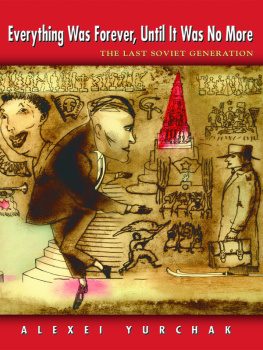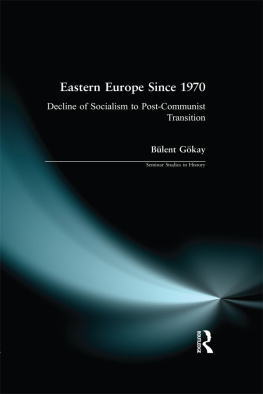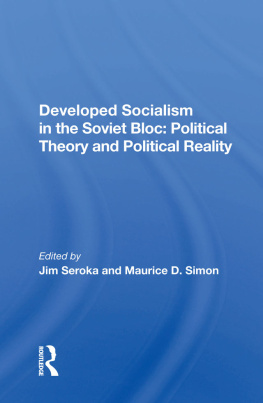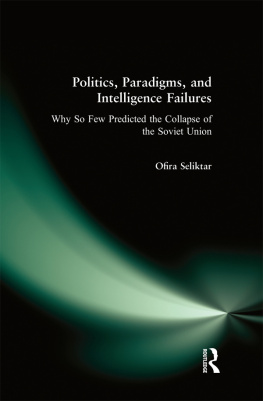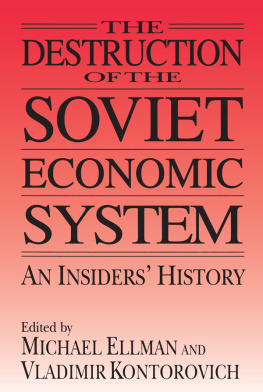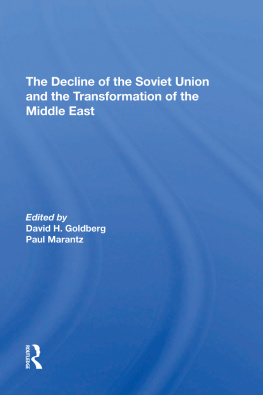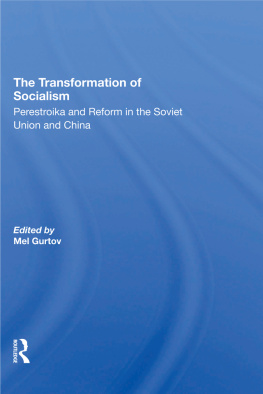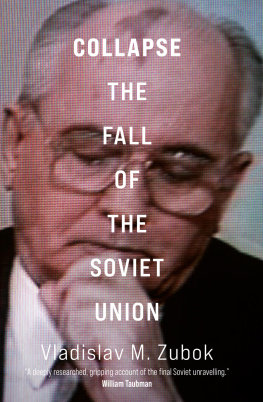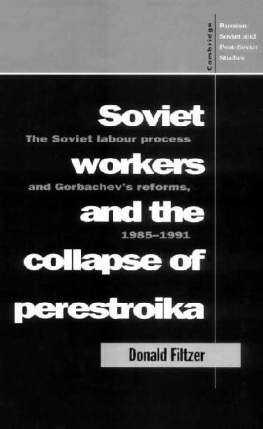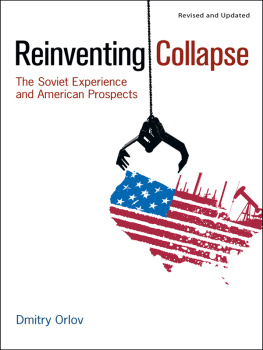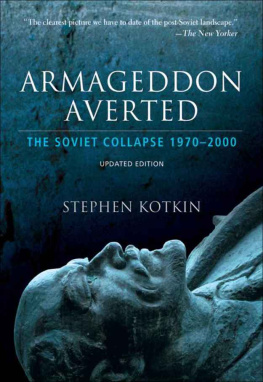
Everything Was Forever, Until It Was No More

Series Editor
Paul Rabinow
A list of titles in the series appears at the back of the book
Everything Was Forever, Until It Was No More
The Last Soviet Generation
Alexei Yurchak
PRINCETON UNIVERSITY PRESS
PRINCETON AND OXFORD
Copyright 2005 by Princeton University Press
Published by Princeton University Press,
41 William Street, Princeton, New Jersey 08540
In the United Kingdom: Princeton University Press, 3 Market Place, Woodstock, Oxfordshire OX20 1SY
All Rights Reserved
Library of Congress Cataloging-in-Publication Data
Yurchak, Alexei, 1960
Everything was forever, until it was no more : the last Soviet generation / Alexei Yurchak.
p. cm.
Includes bibliographical references and index.
ISBN 0-691-12116-8 (cl : alk. paper)ISBN 0-691-12117-6 (pb : alk. paper)
1. Soviet UnionCivilization. 2. Soviet UnionIntellectual life. 3. Socialism and cultureSoviet Union. I. Title.
DK266.4.Y87 2005
947.085dc22 2004042384
British Library Cataloging-in-Publication Data is available
This book has been composed in Sabon
Printed on acid-free paper.
pup.princeton.edu
Printed in the United States of America
10 9 8 7 6 5 4 3 2 1
To my parents,
Vladimir and Natalia
Acknowledgments
Many friends of Russian, foreign, mixed, and confused identities have shared their friendship and intellectual curiosity over the years. Many of them have helped me obtain materials, and reflected on the meanings of Soviet life. I am grateful in particular to Andrei Andreyev, Thomas Campbell, George Faraday, David Fisher, Jessica Gorter, Alexandr Kan, Lena Khaetskaia, Andrei Krivolapov, Victor Mazin, Alla Mitrofanova, Margaret Paxson, Andrei Postnikov, Igor Rozov, Vitaly Savchuk, Oleg Timofeyev, Olesya Turkina, and Evgenii Yufit. Over the past twenty years, inspiring conversations with my friend Svetlana Kozlova have helped to shape my interests and ideas. I am continually grateful to the musicians and actors of the rock band and theater AVIA for their intelligence, camaraderie, and cheerful experimentation with communist ideologies; and especially to Nikolai Gusev and Anton Adassinksythe two masters of the absurd, whose art and everyday aesthetics refined my views of Soviet history.
I would like to thank my professors at Duke University: Claudia Strauss, Ann Allison, Barbara Hernstein-Smith, Thomas Lahusen, William OBarr, and Naomi Quinn. Colleagues and friends, at the University of California at Berkeleys anthropology department and at other universities, have exposed me to intellectual ideas that have deepened my understanding of the subjects of my research. I am particularly grateful for the critical comments and suggestions on various versions and parts of this text that were provided by Ivan Arenas, Diana Blank, Victoria Bonnell, David Brandenburger, George Breslauer, Michael Burawoy, Terence Deacon, Dace Dzenovska, Gil Eyal, Sergei Oushakine, Irina Paperno, Tobias Rees, Annelise Riles, Stas Savitsky, Kim Scheppele, Maria Stoilkova; and also to the students in my Berkeley graduate seminars on post-socialism (fall 2004) and on discourse and performativity (fall 2003). Steven Collier, Zeynep Gursel, and Nancy Ries read various versions of the whole manuscript with great care, providing countless helpful comments and suggestions. Special thanks to Yuri Slezkine for his support, unparalleled Soviet-Texan wit, and for detecting hidden conundrums in the text; and also to Eduardo Cohn, for being a true friend and supportive colleague, who read the whole text at the crucial final stage, and for forcing me to clarify many points.
Several centers and institutes provided their support at different stages of the project: The Harriman Institute at Columbia University; the Centre for Research in Arts, Social Sciences and Humanities at Cambridge University; and the Townsend Center for the Humanities at the University of California, Berkeley. My gratitude extends to Hildegard Diemberger, for her belief in this project, and for organizing, with Robbie Barnett, two seminars around comparative studies of late-socialist elites at Cambridge and Columbia. I am especially grateful to Caroline Humphrey for her warmth and encouragement over the years, and to all the friends and colleagues at Cambridge University who shared intellectual excitement, warm beer, and punting trips on the Cam (with odd Londoners falling in).
At Princeton University Press I want to thank Mary Murrell, my original editor and scrupulous copyeditor, who saw the project through from the very beginning, as well as her successor, the editor Fred Appel, and production editor Debbie Tegarden, for their patience, intelligence, and support. Thanks to Sylvia Benson and Jenna Rice, my student assistants at Berkeley, for meticulous formatting, indexing, and bibliographic research.
My parents have insisted on hearing many parts of the text in the Russian translationa challenging exercise that forced me to refine many arguments. My deepest gratitude goes to Melanie Feakins for her critical involvement with the text, for her love, and for her British vowels.
Everything Was Forever, Until It Was No More
Chapter 1
Late Socialism:
An Eternal State
Mimicry is a very bad concept, since it relies on binary logic to describe phenomena of an entirely different nature. The crocodile does not reproduce a tree trunk, any more than the chameleon reproduces the colors of its surroundings. The Pink Panther imitates nothing, it reproduces nothing, it paints the world its color, pink on pink.
Gilles Deleuze and Felix Guattari, A Thousand Plateaus: Capitalism and Schizophrenia
An Eternal State
It had never even occurred to me that in the Soviet Union anything could ever change. Let alone that it could disappear. No one expected it. Neither children, nor adults. There was a complete impression that everything was forever. So spoke Andrei Makarevich, the famous songwriter and musician, in a televised interview (1994). In his published memoirs, Makarevich later remembered that he, like millions of Soviet citizens, had always felt that he lived in an eternal state (vechnoe gosudarstvo) (2002, 14). It was not until around 1986 and 1987, when reforms of perestroika (reconstruction) were already afoot, that the possibility of the socialist system not lasting forever even entered his mind. Many others have described a similar experience of the profound feeling of the Soviet systems permanence and immutability, and the complete unexpectedness of its collapse. And yet, Makarevich and many Soviet people also quickly discovered another peculiar fact: despite the seeming abruptness of the collapse, they found themselves prepared for it. A peculiar paradox became apparent in those years: although the systems collapse had been unimaginable before it began, it appeared unsurprising when it happened.
When the policies of perestroika and glasnost (openness, public discussion) were introduced in 1985, most people did not anticipate that any radical changes would follow. These campaigns were thought to be no different from the endless state-orchestrated campaigns before them: campaigns that came and went, while life went on as usual. However, within a year or two the realization that something unimaginable was taking place began to dawn on the Soviet people. Many speak of having experienced a sudden break of consciousness (
Next page
